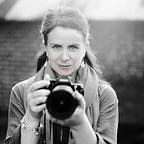My 36 hours in one of the world’s most censored countries- Saudi Arabia
Ask anyone who knows me, they would probably agree that I am someone that pushes limits when it comes to my work. That can be spending long period of time or effort to get a story, working overnight exporting a final cut, or the usual act of taking on multiple projects simultaneously. So it’s not surprise that my one full day in one of the world’s most censored countries, I decided to test the limits of what I could get away with.
I was in the country as a plus one to my partner who was taking some meetings. I thought I would do what I could to really get a sense of what life could be like in Saudi Arabia from my perspective as a woman and as a documentary maker who has always exercised her right to free speech. Breakfast in the hotel was pretty standard, although I was a bit disappointed I wasn’t able to use my Arabic with anyone as everyone I encountered didn’t appear to be Saudi. I was the only western woman there, although I dressed in one of my few long middle eastern dresses I owned but without a hijab or head covering.
The area of Riyadh I was in was along 5 lane highways and surrounded by many kitchen renovation stores. I was able to walk away from the highways and along sidewalks to get me to a coffee shop, very similar to something I would easily do in Amman in Jordan or Beirut in Lebanon. The contrast of the highways to the seldom used sidewalks reminded me a lot of my time in California as one of the few, lone pedestrians. A brisk thirty minutes through the sun and under the shade of some palms I was at Some Coffee that boasted a variety of Arabica coffee varietals, a modern boho decor, and a piano anyone could play.
I walked up to the till and proudly placed my order in Arabic which sounded a bit like this:
“Bidi Qahweh.”
It was a woman behind the till who was wearing a hijab, so I felt confident my order would be well received until she replied,
“No we don’t have decaf.”
Two years of learning Arabic to not only be replied in to in English but with the double insult of thinking I was asking for decaf made me feel quite defeated. I gave in and replied in English and sat down at the end of a co-working bar from a man who was also working and opened my laptop with my drip coffee from El Salvador.
I was able to log onto the wifi with the melody of a man playing the piano in the background, but every page I opened or worked on hesitated to load. They all eventually did, but it took me a few refreshes and opening a few pages before I remembered the delay was due to the extreme censorship.
According to a report in 2019 by the Committee to Protect Journalists, Saudi Arabia ranks fourth in the world of most censored countries. Aside from imprisoning, torturing and killing journalists (A June 2019 UN report called the murder of Jamal Khashoggi “premeditated execution” for which the Saudi government “is responsible,” and called for an investigation into bin Salman’s role) under a 2011 regulation, websites, blogs, and anyone posting news or commentary online must have a license from the Ministry of Culture and Information.
As reported in The New York Times and other sources, the authorities utilise surveillance technology and troll and bot armies to suppress coverage and discussion of sensitive topics, including the war in Yemen to control the country’s perspective on how they understand the ongoing conflict and their country’s role in it. That evening, I continued to push a few more limits before I departed and asked my driver how he felt about what was happening in Yemen and he was fairly neutral and not bothered by the situation or the question — he knew plenty of Yemeni who went back and forth between Saudi and Yemen and had no problems or issues. It made it hard to determine if his perspective was one that was shaped by censorship, but I did appreciate my question respectfully answered even if it made me have more questions.
